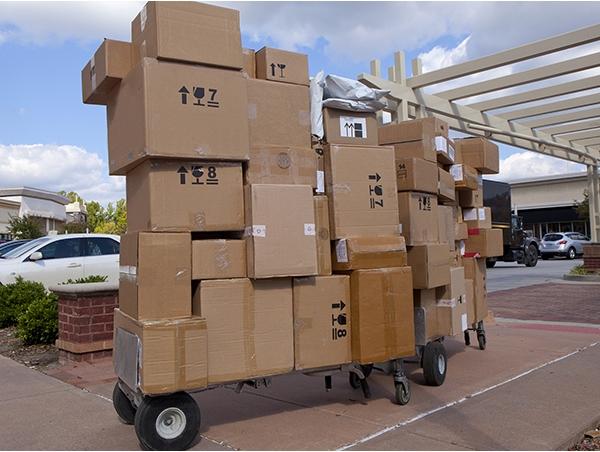In the fast-paced world of global trade, efficient transportation is critical to the smooth functioning of industrial supply chains. One of the most cost-effective and reliable methods for moving large quantities of goods is bulk cargo transportation. Whether through sea, air, or land, bulk cargo offers significant benefits, especially for industries dealing with raw materials, heavy machinery, or large quantities of finished goods. This article explores the advantages of bulk cargo transportation and how companies like Tiger Air, a leading international logistics provider, streamline the process for businesses around the world.
What is Bulk Cargo Transportation?
Bulk cargo transportation refers to the shipment of large quantities of un-packaged goods, typically in large containers or vessels. These goods can range from raw materials like coal, grains, and oil, to finished products, chemicals, and even large equipment. Bulk cargo is transported in its raw, unpackaged form, making it ideal for industries that require efficient handling and cost-effective solutions for high-volume goods.

Key Advantages of Bulk Cargo Transportation
Cost-Effectiveness
One of the primary reasons bulk cargo transportation is favored by businesses is its cost-effectiveness. By transporting goods in large quantities without the need for packaging, companies can significantly reduce packaging and handling costs. Moreover, when bulk shipments are made, shipping rates per unit of goods tend to decrease, as the cost is distributed over a larger volume.
For example, companies like Tiger Air, which specialize in both air and sea freight, can offer competitive rates on bulk cargo due to their efficient logistics networks and expertise in handling large volumes. Whether it's ocean freight for commodities or air freight for urgent bulk shipments, the cost-per-ton ratio becomes increasingly economical with bulk transportation.
Efficiency and Speed
Bulk cargo transportation is generally faster than other forms of shipping. Shipping by sea, for instance, allows companies to move massive quantities of goods in one go, significantly cutting down the number of trips required. This leads to a more streamlined supply chain, ensuring that industrial operations remain uninterrupted.
In cases where urgency is critical, Tiger Air’s air freight services come into play, providing fast transport for bulk goods that need to reach their destination quickly. Air cargo allows for shorter transit times, especially for goods that cannot afford delays, such as high-value components for manufacturing or chemicals needed for pharmaceutical production.
Reduced Risk of Damage
Bulk cargo is typically transported in specially designed containers or ships, which are optimized to protect large shipments from damage. For bulk liquids, grains, and other commodities, specialized tanks and dry bulk containers are used to ensure that the product remains intact during transit. This reduces the risk of damage during transport and ensures that the goods arrive in the best possible condition.
By focusing on bulk cargo handling expertise, Tiger Air ensures that shipments are handled with care, using the right equipment and best practices to minimize damage during both air and sea transport. This is especially important for industries dealing with fragile or perishable goods, such as chemicals or foodstuffs.
Environmental Benefits
Bulk cargo transportation, particularly by sea, is generally more environmentally friendly than other forms of transport. Shipping by sea is one of the most energy-efficient ways to move large quantities of goods, producing fewer emissions per ton-mile compared to road or air transport.
Companies focused on sustainability can take advantage of this aspect of bulk cargo. By using bulk shipments, businesses can reduce their carbon footprint while still maintaining a consistent supply of goods. Moreover, international logistics providers like Tiger Air work to optimize shipping routes, further reducing fuel consumption and minimizing environmental impact.
Flexibility and Scalability
Bulk cargo transportation offers great flexibility and scalability for businesses. Whether you are shipping a few tons of raw materials or hundreds of tons of finished products, bulk transport can be scaled to meet your specific needs. This is particularly advantageous for industries like manufacturing, energy, and agriculture, which often require the transportation of large and diverse quantities of materials.
Tiger Air excels in providing customized solutions for bulk cargo, offering tailored services to accommodate specific needs, whether for bulk liquids, dry goods, or oversized industrial equipment. This flexibility helps businesses plan their logistics more effectively and adapt to fluctuations in demand or supply chain disruptions.
Consolidation of Shipments
Bulk cargo allows for shipment consolidation, where goods from multiple suppliers or manufacturers are combined into one large shipment. This reduces the need for multiple smaller shipments, optimizing both costs and logistics. By consolidating bulk shipments, businesses can minimize transportation expenses and improve their supply chain efficiency.
Tiger Air offers expert consolidation services, helping businesses combine goods from various suppliers into a single shipment. This ensures efficient logistics management, especially when dealing with multiple product lines or international suppliers. By consolidating shipments, businesses also benefit from streamlined customs processes and reduced handling times.
How Tiger Air Enhances Bulk Cargo Transportation
As a company that specializes in air freight, sea freight, warehousing, and distribution, Tiger Air is uniquely positioned to handle the complexities of bulk cargo transportation. Here’s how Tiger Air streamlines the process for businesses:
End-to-End Logistics: Tiger Air provides a full-service logistics solution, from warehousing and inventory management to door-to-door delivery. This end-to-end approach allows businesses to focus on their core operations while leaving the logistics to the experts.
Global Reach: With a vast network of partners and global shipping routes, Tiger Air can handle bulk cargo shipments anywhere in the world, ensuring timely deliveries and reliable service. Whether it’s shipping raw materials across oceans or transporting goods via air, their extensive network supports efficient movement of bulk cargo.
Custom Solutions: Tiger Air offers tailored solutions based on the specific requirements of each client. Whether it's for hazardous goods, oversized items, or time-sensitive shipments, they provide customized services to meet diverse needs.
Real-Time Tracking: With Tiger Air’s advanced tracking system, businesses can monitor their bulk cargo shipments in real-time. This provides transparency and allows for proactive decision-making, reducing delays or potential issues along the way.
Conclusion
Bulk cargo transportation offers a multitude of advantages for businesses looking to streamline their industrial supply chains. From cost savings and efficiency to reduced risks and environmental benefits, bulk shipping is a key component in managing large-scale logistics operations. By partnering with an experienced logistics provider like Tiger Air, companies can ensure that their bulk cargo is handled with the utmost care and efficiency, ensuring timely deliveries, reduced costs, and seamless supply chain management.
With Tiger Air’s extensive expertise in air and sea freight, warehousing, and distribution, businesses can rely on their services to handle bulk shipments with flexibility and precision, enabling them to focus on growth while keeping their operations running smoothly.
From Port to Destination: Understanding the Logistics of Bulk Cargo Transportation Services



